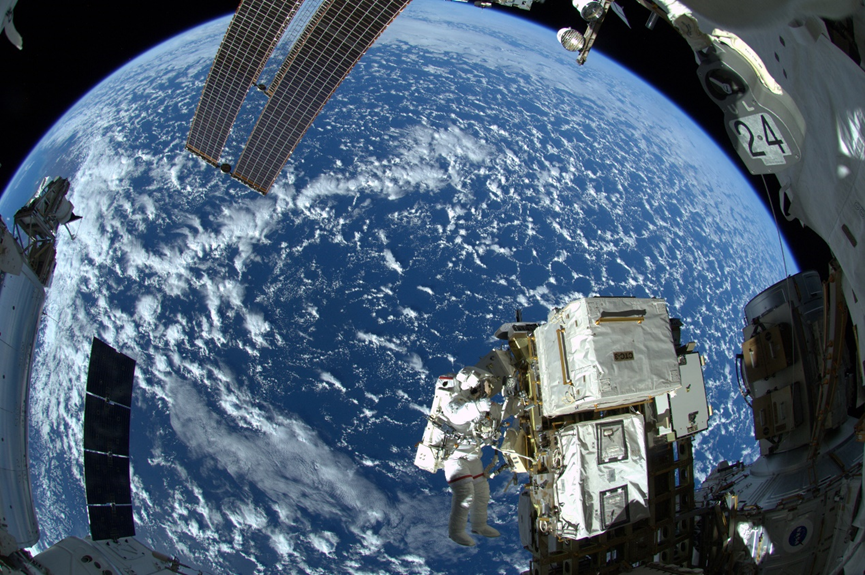:/Alexander Gerst/NASA/ESA/Handout
Emma Charlton
:1.8,2035,,,2023630020351.8
::1.8
This aligns with the views expressed by Dr. Alice Bunn, CEO of the Institution of Mechanical Engineers and Chair of the UK Space Industry Trade Association, during her interview with the forum.Bunn is also a member of the Space Futures Task Force within Forum’s Global Future Council on Space, and she notes that space technology has a more direct and profound impact on our daily lives than many of us realize—ranging from weather forecasting and climate monitoring to navigation and telecommunications.Bunn said, "There are numerous space applications that are genuinely shaping our everyday lives. It’s incredibly powerful—and that’s precisely because of the unique vantage point we have when looking down at Earth, giving us the chance to see that iconic image of our planet."Most of the data used in weather forecasting comes from space, and more than half of the monitoring data collected to track climate change also originates from outer space. Satellite navigation and telecommunications similarly rely on data sourced from space.Space exploration transcends national boundaries.In addition to the economic benefits outlined in the forum report, space technology can also help address global challenges, such as disaster response and climate monitoring. The report emphasizes that collaboration between the public and private sectors is key to fully unlocking the potential of the space economy.Bunn says that while images of Earth viewed from space or rocket launches are undeniably iconic, space travel remains largely impractical for most people—still very much "a billionaire's dream."She believes that space exploration is a field capable of driving the growth of other industries, transcending the boundaries of traditional sectors. While the initial investment costs are substantial, and challenges remain in managing the vast amounts of space data, the potential rewards far outweigh these obstacles.Cross-national and cross-industry informal and formal collaborations will be crucial, especially for large-scale projects like satellite missions and lunar exploration. Looking ahead, Bunn is most excited about the scientific discoveries expected from future space missions—and also intrigued by the potential of space-based manufacturing to address critical resource shortages here on Earth.Space exploration must be grounded in scientific research, as discoveries made in space can profoundly impact life on Earth—take, for instance, the discovery of the ozone hole.The forum's report noted that space technology will increasingly permeate everyday life, continuing to drive innovations such as smartwatches, advanced pharmaceuticals, and extreme weather alerts.The widespread application of space technologyWhile consumers may know little about the role of space technology, industry leaders have already recognized its impact.Similar to the early days of the internet, the emerging space data and services will drive revenue growth and efficiency gains across industries—while also attracting both commercial and government investments. To sustain this momentum, all stakeholders must collaborate on standardization, accessibility, and education, fostering the global adoption of space-tech-powered applications.To highlight the wide-ranging applications of space technology, Bunn cited a case from Vietnam, where satellites predicted an outbreak of mosquito-borne diseases six months before it occurred—giving authorities ample time to develop and implement effective medical response plans."The value of doing this lies in the fact that they have six months to prepare before an outbreak occurs," Bunn said. "This allows them to deploy mobile medical facilities and ensure the disease can be contained. With the support of space technology, these kinds of efforts could happen anywhere in the world."Bunn also emphasized the importance of space sustainability. In the past, when countries launched space missions, most lacked the planning or capability to recover their equipment and bring it back to Earth—meaning that space is now littered with discarded debris. She said: "It’s like buying a brand-new car filled with gas—but once the fuel runs out, you’d just want to abandon it."Bunn said that new developments in the space industry mean that repairing satellites in space could become a reality in the future. "This is a more sustainable approach, allowing us to make the most of our space environment."
The above content solely represents the author's personal views.This article is translated from the World Economic Forum's Agenda blog; the Chinese version is for reference purposes only.Feel free to share this on WeChat Moments; please leave a comment below the post if you’d like to republish.
Translated by: Sun Qian | Edited by: Wang Can
The World Economic Forum is an independent and neutral platform dedicated to bringing together diverse perspectives to discuss critical global, regional, and industry-specific issues.
Follow us on Weibo, WeChat Video Accounts, Douyin, and Xiaohongshu!
"World Economic Forum"






